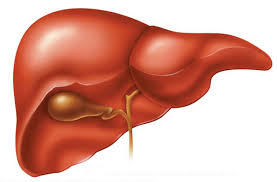liver
英 ['lɪvə]
美 ['lɪvɚ]
CET4 TEM8 考 研 TOEFL CET6
liver 肝来自PIE*leip,脂肪,词源同lipid,adipose.引申词义肝。
- liver (n.1)
- secreting organ of the body, Old English lifer, from Proto-Germanic *librn (cognates: Old Norse lifr, Old Frisian livere, Middle Dutch levere, Dutch lever, Old High German lebara, German Leber "liver"), perhaps from PIE *leip- "to stick adhere; fat." Formerly believed to be the body's blood-producing organ; in medieval times it rivaled the heart as the supposed seat of love and passion, hence lily-livered. Liver-spots, once thought to be caused by a dysfunction of the organ, is attested from 1730.
- liver (n.2)
- "one who lives (in a particular way)," late 14c., agent noun from live (v.).
- 1. Liver and kidney are particularly rich in vitamin A.
- 肝脏和肾脏富含维生素A。
来自柯林斯例句
- 2. Liver cancer is linked to the hepatitis B virus.
- 肝癌与乙肝病毒存在关联。
来自柯林斯例句
- 3. These compounds bind with genetic material in the liver.
- 这些化合物在肝脏中与遗传物质实现结合。
来自柯林斯例句
- 4. Contraindications for this drug include liver or kidney impairment.
- 这种药物的禁忌证包括肝脏或肾脏损伤。
来自柯林斯例句
- 5. Exploratory surgery revealed her liver cancer.
- 探查性的外科手术查出她患了肝癌。
来自柯林斯例句
[ liver 造句 ]
